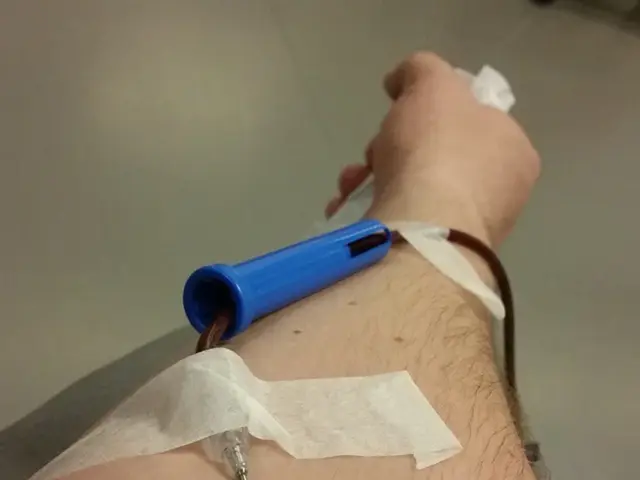Cancer deaths and recurrence rates could potentially be reduced by half when immunotherapy is included in colon cancer treatment plans.
Loosening the Grip of Colon Cancer:
Colon cancer, one of the world's most common cancers, claims numerous lives each year. On the horizon, however, we find a glimmer of hope, particularly for those battling a specific type known as deficient mismatch repair (dMMR) colon cancer.
Current treatments for colon cancer include surgery, radiation therapy, immunotherapy, and chemotherapy, yet not all approaches work for every cancer type. For instance, dMMR colon cancer encompasses around 5-15% of cases and may present lesser responsiveness to chemotherapy than other types.
Recently, a ground-breaking study presented at the 2025 ASCO Annual Meeting revealed that adding immunotherapy to chemotherapy after surgery for stage 3 colon cancer may slash cancer recurrence and death rates by half. Adding the immunotherapy drug, atezolizumab—which targets a specific protein in cancer cells—to the popular chemotherapy regimen mFOLFOX6, has proven a game-changer.
A Closer Look at Atezolizumab
In this phase III clinical trial, researchers gathered 712 participants with dMMR stage 3 colon cancer, averaging 64 years in age. When the cancer spreads to lymph nodes but nowhere else, it qualifies as stage 3. All participants had undergone surgery, leaving cancer cells in their lymph nodes.
Participants were randomly split into two groups: one receiving the conventional chemotherapy, the other a mix of mFOLFOX6 and the PD-L1 battler, atezolizumab. By binding and blocking PD-L1, atezolizumab enables the immune system to identify and eliminate cancer cells.
The Power in a Pair
Researchers uncovered that patients receiving the dual-layered therapy experienced a staggering 50% decrease in recurrence and death—known as disease-free survival (DFS)—compared to the chemotherapy-alone group.
"The findings from our study mark a major advance in the adjuvant treatment of dMMR stage 3 colon cancer," says Frank Sinicrope, MD, the study's lead author and an oncologist at the Mayo Clinic in Minnesota. He notes, "This is a crucial step forward for our patients, offering them a new treatment approach that significantly lowers the risk of recurrence and boosts their chances of survival."
While further studies are needed for a detailed understanding of long-term survivability and recurrence data, such findings herald a new era in colon cancer treatment. "By utilizing immunotherapy at earlier stages of disease, we are achieving meaningful benefits for our patients," Sinicrope adds.
A Shift in Paradigm
Experts in the field commend the trial's results. Glenn S. Parker, MD, FACS, FASCRS, vice chairman of surgery and chief of colorectal surgery at Hackensack Meridian Jersey Shore University Medical Center in New Jersey, comments, "This study signals a significant leap in the care of our patients with dMMR colon cancer."
Parker emphasizes that this new therapy, which works in tandem with the immune system, may particularly target the genetic differences of dMMR tumors, reducing the chances of recurrence and ultimately enhancing long-term outcomes.
Biomarker Analysis and the Future of Treatment
Fueling ongoing exploration, further studies should investigate whether extended follow-up, quality-of-life assessments, and biomarker analyses could refine the integrated therapy into standard care, enabling doctors to provide this potentially life-saving option to eligible patients. In addition, examining the possibility of immunotherapy eliminating the need for chemotherapy for some dMMR patients with high immune activation profiles may be pivotal in shaping the future of colon cancer treatment.
Wael Harb, MD, a board-certified hematologist and medical oncologist at MemorialCare Cancer Institute at Orange Coast and Saddleback Medical Centers in Orange County, CA, underscores the potential importance of this research: "The world urgently needs additional therapeutic options for colon cancer, and this study reveals a significant step forward. The combination of standard chemotherapy with atezolizumab, an immune checkpoint inhibitor, could offer an effective means of keeping cancer from returning in patients with stage III colon cancer characterized by dMMR."
By adopting personalized treatments, like the atezolizumab-chemotherapy duo, for this subset of patients, medical professionals may revolutionize the standard approach to fighting colon cancer. Hope springs eternal as the dawn of a new era in colon cancer treatment begins to take shape.
- Colorectal cancer, a chronic disease and one of the world's most prevalent cancers, often leads to fatalities.
- Despite treatments like surgery, radiation therapy, chemotherapy, and immunotherapy, not all approaches are effective for every cancer type.
- A specific type, deficient mismatch repair (dMMR) colorectal cancer, encompasses around 5-15% of cases and may exhibit lesser responsiveness to chemotherapy.
- In 2025, a study presented at the ASCO Annual Meeting suggested that combining immunotherapy with chemotherapy could halve the cancer recurrence and death rates for stage 3 dMMR colorectal cancer.
- The study combined the PD-L1 battler, atezolizumab, with the popular chemotherapy regimen mFOLFOX6 to target and eliminate cancer cells, boosting the immune system's ability to identify them.
- In the trial, participants receiving the dual-layered therapy experienced a 50% decrease in recurrence and death, or disease-free survival (DFS), compared to the chemotherapy-alone group.
- The findings mark a significant advancement in the adjuvant treatment of dMMR stage 3 colorectal cancer and offer a new treatment approach that reduces the risk of recurrence and boosts chances of survival.
- Further studies are necessary to understand long-term survivability, recurrence data, quality-of-life assessments, and biomarker analyses to integrate the therapy into standard care for eligible patients.
- The combination of standard chemotherapy with atezolizumab, an immune checkpoint inhibitor, could offer an effective means of keeping cancer from returning and may revolutionize the standard approach to fighting colorectal cancer.







